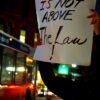The Dirty Politics of Jeffrey Epstein: How a Scandal Could Finally Shake the Oval Office.
The Dirty Politics of Jeffrey Epstein: How a Scandal Could Finally Shake the Oval Office.

Power & Silence
The news as it trends
Opinion, Politics, Justice & Accountability
From Hugh Hefner’s Playboy Mansion to Jeffrey Epstein’s infamous private island, American society has long been haunted by powerful men draped in prestige and influence, while quietly operating behind closed doors in exploitation.
Because let’s think about it—tied to these men are power and privilege stretching from media to the judicial system.
And with that privilege comes the means to make nearly anything disappear.
These circles of protection didn’t spring up overnight. They’ve been baked into decades of systemic hierarchy within America’s elite institutions.
Whispered scandals surrounding sexual abuse, drugs, manipulation, and suppression have threaded themselves through generations of high society.
But in 2021, when Ghislaine Maxwell was convicted for sex trafficking minors, the silence began to crack. The system stirred awake.
And the secrecy? Still stubbornly intact.
Once upon a time in the Playboy era, Hugh Hefner admitted in a chilling posthumous report that he had destroyed tapes collected over the years—allegedly featuring high-profile guests engaged in compromising acts.
He claimed to have dumped those tapes in the sea, warning that if the footage ever surfaced, reputations would collapse and careers would be destroyed.
What exactly was on those tapes? No one knows.
But it signals a legacy of elite misconduct masked by glamour—and enabled by power and privilege sufficient to erase it.
Fast forward to Epstein and Maxwell.
Their saga unearthed a broader network of access, protection, and wealth—a story no longer whispered, but spoken louder with every survivor, every record unsealed, and every political tremor that follows.
Epstein’s rise began in Brooklyn.
Despite lacking a college degree, he secured a math teaching job at an elite private school in Manhattan.
That role positioned him among the wealthy, launching him into high finance.
By the late 1970s, he joined Bear Stearns, then founded J. Epstein & Co.—a firm reportedly designed to serve only billionaires.
One prominent client was Victoria’s Secret founder Leslie Wexner, who allegedly gave Epstein sweeping financial control and access to a Manhattan mansion.
Epstein’s world included private jets, estates in Palm Beach, Paris, the Virgin Islands, and a web of influence with celebrities, academics, and scientists.
But according to survivor testimony and investigations, behind the luxury lay a system of grooming, coercion, and trafficking.
Victims were often minors—some as young as 14.
His first arrest came in 2005, after a Florida parent reported Epstein’s abuse.
That case led to the now-infamous 2008 plea deal, awarding Epstein a lenient sentence and granting immunity to his co-conspirators.
The crimes continued. And in 2019, federal prosecutors in New York reopened the case.
Why? Because new evidence had emerged—connections, travel records, and fresh victim accounts that proved the scope extended far beyond Florida.
Epstein was arrested and charged—only to die in jail under suspicious circumstances before trial.
His death was officially ruled a suicide. But the American public’s demand for answers only grew louder.
Then came Ghislaine Maxwell.
She was arrested in July 2020 at a secluded estate in New Hampshire, purchased through a shell company.
After Epstein’s death, Maxwell reportedly went into hiding, fearing prosecution.
Her name had been linked to allegations that she sourced victims for Epstein’s operation.
Her trial was held in the Southern District of New York.
Prosecutors presented overwhelming evidence: underage victim testimony, flight logs, and financial records pointing directly to her involvement.
Maxwell was convicted in 2021 on five federal counts and sentenced in 2022 to 20 years in prison.
She now serves that sentence at FCI Tallahassee, a low-security federal prison in Florida, near one of Epstein’s former residences.
Reports say she currently teaches yoga and etiquette to fellow inmates.
But despite the conviction, public outrage persists.
The glaring contradiction remains: if Maxwell was guilty of trafficking girls, who received them? How could a crime occur “to no one”?
After months of MAGA supporters demanding answers, many blaming one half of the political class, the Department of Justice—now led by Pam Bondi under Trump—announced that there was no Epstein client list.
A response that only deepened the controversy.
More than 100 victims were tied to Maxwell’s case, and survivor accounts tell a different story.
In typical federal prosecutions, files include names, affiliations, and context. Yet most names remain hidden.
Survivors like Virginia Giuffre and Annie Farmer publicly named powerful individuals, including Prince Andrew.
Reports at the time said the Queen was devastated to learn her son was implicated in anything connected to Epstein.
Melinda French Gates also confirmed in a live interview that Bill Gates’ meetings with Epstein were one of the reasons she filed for divorce.
She described Epstein as “evil personified” and said she regretted ever meeting him.
During that interview, numerous commenters on social media questioned what kind of misconduct could have provoked someone with a partner like Bill Gates — a man of immense wealth and global stature — to walk away.
Was there something so obscene, tied to the Epstein case, that it pushed her to a breaking point where divorce became the only option?
Others involved in the investigation testified anonymously.
Over 100 victims have come forward. Yet to date, only Epstein and Maxwell have faced legal accountability.
Then another twist.
On the night of July 16, 2025, Donald Trump fired Maurene Comey, a federal prosecutor deeply involved in the Epstein case and daughter of former FBI director James Comey.
Her removal came days after the DOJ doubled down on its claim that no list exists.
At the same time, Democratic lawmakers proposed a bill to release sealed documents.
Every Republican member voted against it.
That raised a piercing question: if the list doesn’t exist, why block a vote to release it?
Legal experts argue this behavior smacks of political interference—and a possible cover-up.
Trump publicly called the Epstein scandal a hoax and urged supporters to move on.
But many believe it’s inching too close to the Oval Office.
And MAGA supporters, once quiet, are now demanding answers with ferocity.
The implications of Epstein’s scandal stretch far beyond Maxwell.
America has watched powerful men fall—Eliot Spitzer resigned over escort revelations; Harvey Weinstein was jailed for decades of sexual abuse; and NXIVM exposed trafficking cloaked as empowerment.
Governors, CEOs, and media icons have been held accountable.
But many names remain hidden.
The Epstein Victims’ Compensation Program, created in 2020, paid $121 million to over 150 survivors before closing in 2021.
Additional lawsuits against Epstein’s estate led to millions more in compensation, funded through property sales.
One survivor was Virginia Giuffre, who tragically died by suicide in early 2025—a sobering reminder of how deep the wounds go.
Today, the client list is no longer just a demand. It’s a symbol.
A symbol of what remains buried. Of people protected by wealth. Of victims still waiting for justice.
The silence surrounding it sends a dangerous message—that reputation is worth more than accountability.
From Hefner’s hidden tapes to Epstein’s jet, from shell companies to sealed court files, what’s unfolding under Trump’s presidency today in relation to the Epstein case is more than a scandal.
It’s a system designed to shield the elite, while vulnerable lives pay the price.
And the more MAGA supporters erupt across social media and podcasts demanding answers, the louder the storm grows — no longer a whisper, but a thunderous roar echoing through every corner of American politics.
If this storm continues, and justice finds the courage to unseal the rest, America may finally be forced to reckon with who has been protected, for what purpose—and at what cost.
And as demands for exposure grow louder, the storm surrounding Trump’s Justice Department and presidency may turn into a reckoning that no amount of denial can silence.
Today, the question continues to be asked: Is there a client list?
The narrative of Epstein’s life and legal proceedings speaks for itself.
Though the Department of Justice under Trump denies its existence, court records, survivor testimonies, financial settlements, and Maxwell’s 20-year conviction suggest otherwise.
Over 100 victims have come forward, and Epstein’s assets were liquidated to fund compensation.
No other individual has been prosecuted.
With Trump now facing backlash after reportedly firing a prosecutor tied to the case—Comey’s daughter—the controversy has only intensified, opening a wider can of worms.
At this juncture, the public has every reason to examine the facts and form their own informed judgment.
Yetunde B reports for Yeyetunde’s Blog.




















Leave a Reply